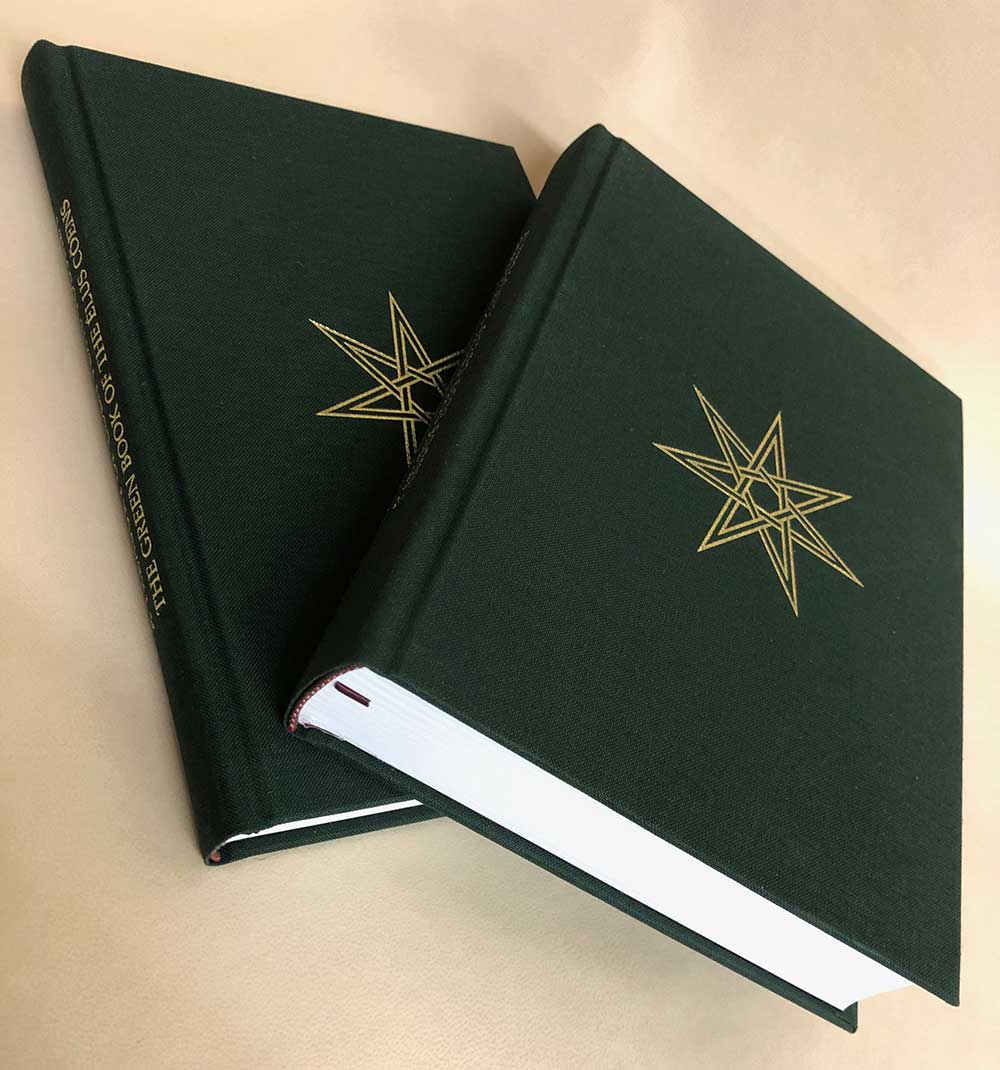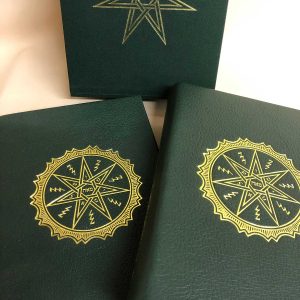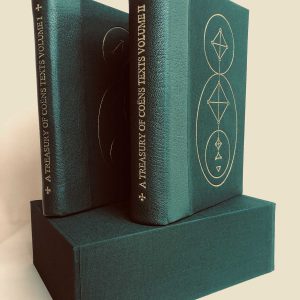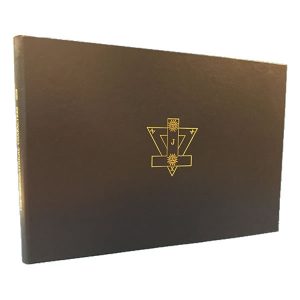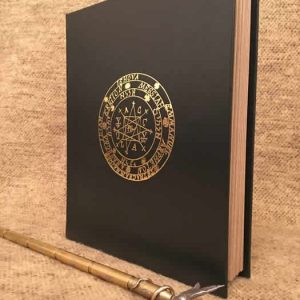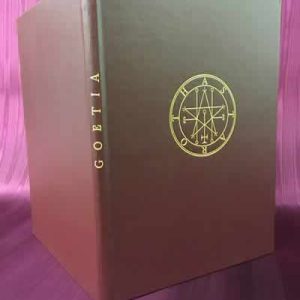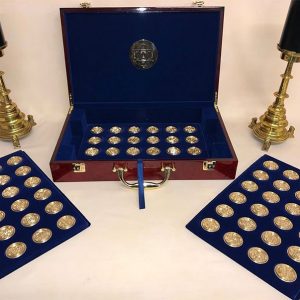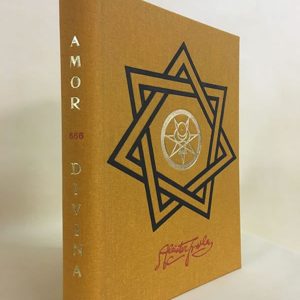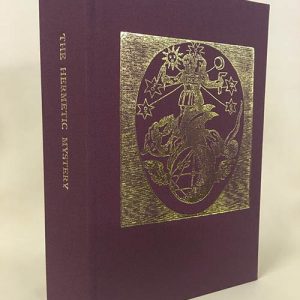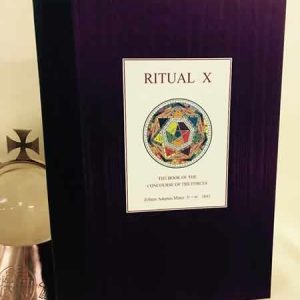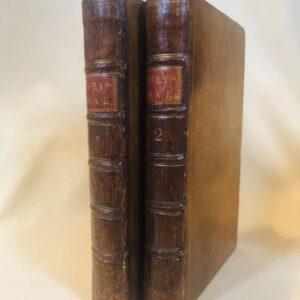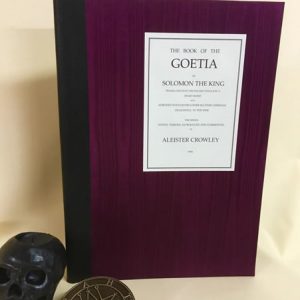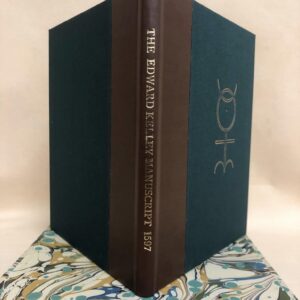A TREASURY
OF COËN TEXTS
IN TWO VOLUMES
620 pages
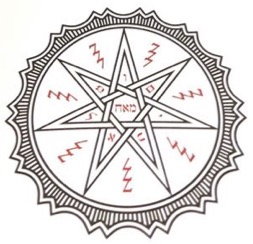
This is the first true and complete ‘Manuscript d’Alger’ or ‘Algiers manuscript’
and the first time in English
*
French linen Toiles du Marais bottle green, with claret endpapers, claret marker ribbons, red and green headbands
Click here for the leather edition ltd to 45 sets
Click here for the quarter leather edition ltd to 60 sets
*
‘The Élus Coën were spiritual warriors engaged in magical combat
with angelic and demonic entities.’
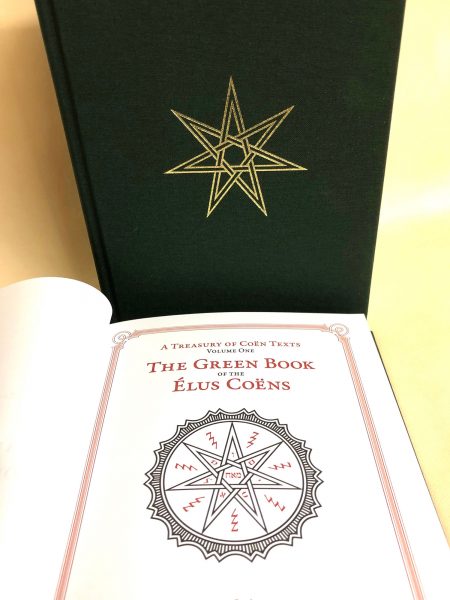
These original rites of the Élus Coën, instruct the initiate how to enter into relations with angelic spirits, which are sympathetic to Man’s fallen state, and who aid him upon the path to reintegration with the Divine… One will see the overt influence of the Abramelin ritual in the materials, not only in the pursuit of one Guardian Angel, out also in the specifics of the ceremonial preparations.
*
Volume I
THE GREEN BOOK OF THE ÉLUS COËN
(The COMPLETE Manuscrit d’Alger 1772)
Volume II
VARIOUS ÉLUS COËN MANUSCRIPTS
including the complete ‘Registry of 2,400 Angelic Names’
and the ‘Serpent Diagrams’ of Prunel de Liere
Reproduced here in its entirety in facsimile,
the original being found within Bibliothèque Municipale de Grenoble.
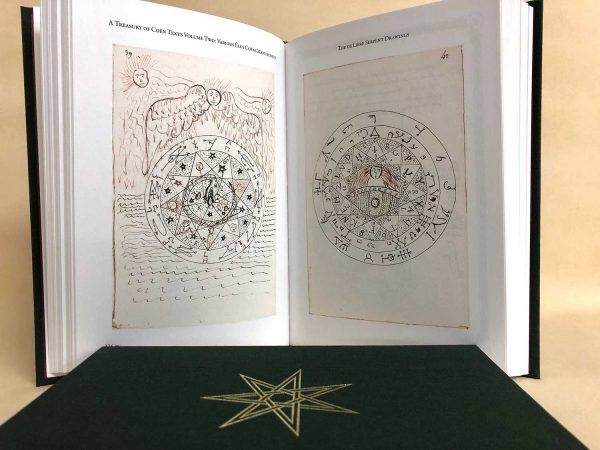
From the Prunel de Liere Serpent Diagrams
‘..The cult practised by the Élus Coëns is the primitive cult entrusted by God to Adam secretly transmitted through the generations.’
This complete English translation of the rediscovered eighteenth-century Coen manuscript, known to some as Le Manuscript d’Alger (1772) provides for the first time a view into this powerful system of angelic magic, ritual theurgy and mystical sacrifice.
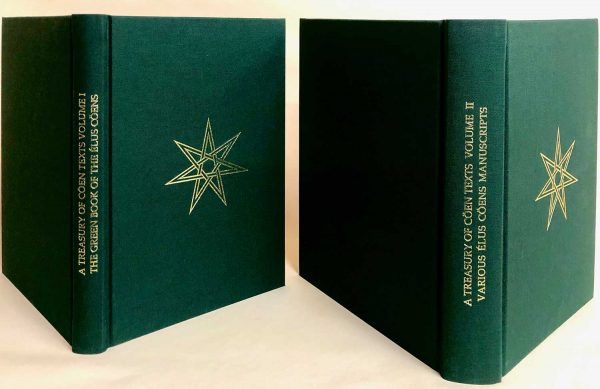
Images of the present cloth edition 285 sets
The Occult Order
of the Knights Elect Cohen of the Universe
Theurgic and Mystical school of the 18th Century:
The massive influence of this tradition can be traced through many occult
and mystical groups still active today:
– Martinism –
– Rosicrucianism –
– The Rites of Memphis and Misraim –
– The Hermetic Order of The Golden Dawn –
– Ordo Templi Orientis –
– Voodoo cults in Haiti and beyond –
As the High-Degrees of Freemasonry swept across the landscape of eighteenth-century Europe, an obscure and secret occult order started to develop known as l’Ordre des Chevaliers Elus Coens de l’Universe or the ‘Order of Knight-Mason Elect-Cohens of the Universe’, more commonly referred to as The Elus Coen.
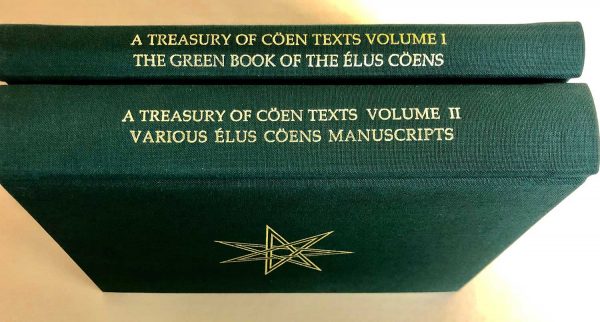
Recognised as the most serious and illustrious of the eighteenth-century esoteric masonic societies, much of the Order’s authentic original materials have been lost or forgotten for centuries.
The ‘Green Book’ or Algiers Manuscript is the largest and most significant single source, but we have also included additional facsimile sections from Ms. T.4188, par Prunel de Liere, held at the Bibliotheque Municipale de Grenoble and other important material.
Detailing the inner workings and highest degrees of the Order, this fascinating translation and collection of manuscripts enlightens the reader in the true, very visceral nature of the Order. Requiring the utmost commitment, and a dedicated lifestyle, the Order prescribed everything from hair style to diet.
Far from the everyday festivities of mainstream freemasonry, The Elus Coen were spiritual warriors engaged in magical combat with angelic and demonic entities. These original rites of the Elus Coen, instruct the initiate how to enter into relations with angelic spirits, which are sympathetic to Man’s fallen state, and who aid him upon the path to reintegration with the Divine.
Mastering the forces of astral currents which appear in the symbols of the ‘Registry of 2,400 Names’ is the key to occult power.
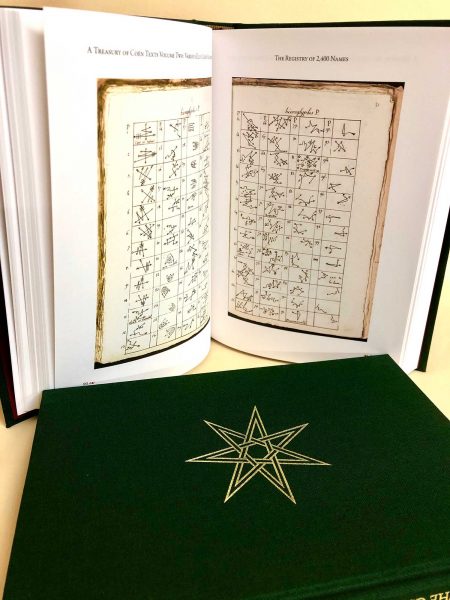
Pages from the Registry of 2400 Angelic Names
One will see the overt influence of the grimoire tradition as well as the teachings of Abramelin in the materials, not only in the pursuit of one Guardian Angel, out also in the specifics of the ceremonial preparations.
This title ‘Green Book’ comes from the appearance of the manuscript itself given the colour of the original binding. The secondary title of ‘Algiers Manuscript’ does not appear anywhere in the manuscript itself, it comes from the fact that the manuscript (accompanied by a record of twenty-three leaflets) was found and bought on the market of SaintOuen by an antique dealer in Algiers during the Second World War. In order to preserve their archives, most Masonic obedience’s had reconstituted their ‘staff’ in Algiers. After purchase the manuscript was sold to Marguerite Benama, friend of Robert Ambelain, in 1955. Mrs. Benama then gave the entire acquisition to Robert Ambelain who, in turn, in 1993, donated it to the National Library, accompanied by the sheets now associated with the ‘Algiers Ms’ The original manuscript was probably written from 1770 to 1772.
It was sent by small consignments, partially to Champollon, Grainville and Willermoz via Marduel. The author of the manuscript was Andre Pierre de Grainville, and the manuscript would appear to be something of a working manual for Reaux-Croix initiates.

To maintain the secrecy of this material it became something of a tradition amongst Martinist circles to confuse the ‘Manuscript d’Algier’ with a selection of other documents from a manuscript known as The ‘Prunel le fonds de Liere’: a document found in the public library of Grenoble. Dominique Clairembault notes that Auguste Viatte, in 1928, and Alice Joly, in 1938, were the first to emphasise the Prunelle collection’s importance. Since 1962, Robert Amadou had studied that collection, of which he published a very incomplete inventory. In 1969, the magazine ‘lnitiation’ announced a project to publish the ‘Fonds Prunelle de Liere’ by Jacques Baradat, a collaborator of Robert Amadou.
Robert Amadou’s version of the ‘Fonds’ material is a mess. It includes whatever he could get his hands on from various sources, not only from the hand of Louis Claude de Saint-Martin.
Strangely, this project never happened and all the more strange is the fact that original reproductions of pages are well known. However, the public library of Grenoble stamps were removed on these copies, making it impossible to guess the source. The publisher Les Gouttelettes de Rosie, wrongly presented them as coming from the Manuscript d’Algier (coming from Joel Duez, who had received them himself from Marcel Jirousek), a statement that Robert Amadou soon denounced. In the introductory text, Philippe Pissier and Matthieu Leon specify that they obtained these documents during the second half of the 1980s, from Joel Duez, who had received them himself from Marcel Jirousek, Belgian disciple of Robert Ambelain. These documents were wrongly transmitted to them under the name of “Manuscript d’Alger’.
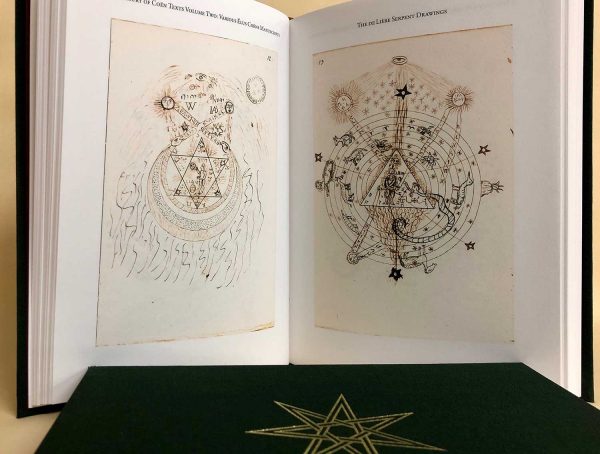
‘The king of the Universe is imprisoned in a dark abode,
but there he maintains a striking image of his primal grandeur.’
(Instruction secrète aux Grands Profès)
Perhaps more than any other, Jean-Baptiste Willermoz (1730-1824) helped ensure the survival of original Elus Coen doctrine handed down by Martines de Pasqually, by his weaving of it into the secret grades of the Régime Ecossais Rectifié.
Consisting instructional discourses, entitled the Instruction secrète au Profès (Secret instruction to the Profès) and the Instruction secrète aux Grands Profès (Secret instruction to the Grands Profès), both written before 1778, the Profès and the Grands Profès served as a repository of sorts for Pasqually’s complex theosophical doctrine, if not its actual practices.
Detailing a secretive shadowy history transmitted down through the ages, these inner degrees of Willermoz’s ‘Régime Ecossais Rectifié’ recalled the existence of a ‘primitive, essential and fundamental Order’ to which masonry would be the final inheritor.
For Martines de Pasqually however, this hidden primitive Order, or rather primitive cult, was a form of theurgy involving powerful magical operations. The cult practised by the Élus Coëns is the primitive cult entrusted by God to Adam secretly transmitted through the generations.
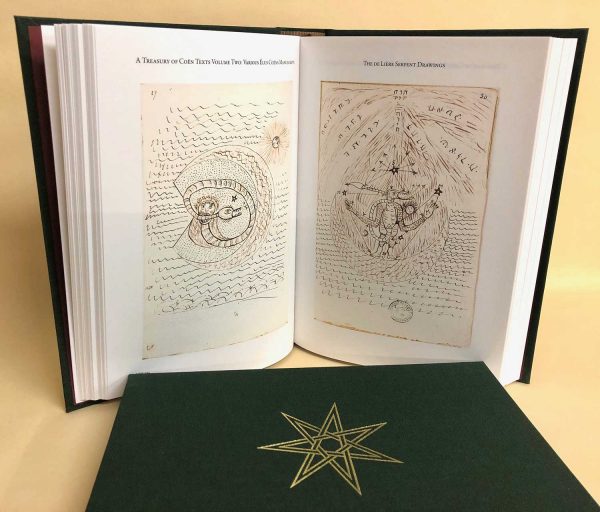
Initiation within The Order of Élus Cohen
Imagine yourself with a face covered in ash from a burnt offering. The smell of incense and scorched hair filling the room. Three days have passed, and in the flickering candle light, you struggle with the recitation of prayers and holy names; before you sits the severed head of a stag deer. In its skull is a sword and an oath. The floor on which you sit is as alive as the Universe itself covered in chalked out circles of magical and serpentine power. Your hands pass over a flame, and a blade is presented with instructions to remove the tongue and brain from the animal’s head. Using the dagger, the bone makes it difficult to break its temple but you manage to lift the organs from the skull and place them in the stove covered in hieroglyphic signs. Its tongue and the remains of the head burn in separate stoves at either end of the room: you are now an initiate ‘Reaux-Coix’.
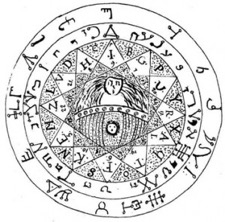
The cult instructed its initiates in the drawing of a hieroglyph on the floor for magical operations. The hieroglyph, found from among a list of 2,400 hieroglyphs provided by Martinès de Pasqually himself, corresponded to a particular angel, and if the operation was successful, a further hieroglyph would appear in ‘luminous form’. These luminous astral hieroglyphs act as a signature of the spirits who have chosen to cooperate with the theurgist on his path to reconciliation with the Divine.
*
The Élus Coëns’ raison d’être then, is to perform this cult in its fullest sense as a form of gnosis for the betterment of all. As was stated in the ‘99th Leçon de Lyon’ taught during the years 1774 to 1776: ‘The true ceremonial cult was taught to Adam after his fall by the reconciling Angel…’
*
A Sample of Contents Volume I: 220 pages
Translation of the complete, true ‘Manuscrit d’Algier’ 1772
Letter On the Relationship of Harmony with Numbers
Ceremonies of the Four Annual Banquets Order of the Coens
Personal Instruction Work in the Presence of the Sovereign Alone for any Day of the Week
Quarter Angle for Commander of the East &c
Preventative Operation Against Evil
Exconjuration and Exorcism in the South
Quarter Angle of Body Purification with Three Rays &c
Extract from an Instruction of D [on] M [ artinez]
Instruction on an Invocation of Reconciliation
Invocation of Master Coens &c
Detached pieces from the ‘White Book’
Catechism of the Philosophers Elus Coens
Catechism of Master Coens
Grand Masters also called Grand Architects
Grand Elect of Zerubabel
A Sample of Contents Volume II: 604 pages
The Registry of 2400 Angelic Names ‘Fonds Prunel de Liere’ manuscript
The de Liere Serpent Drawings
On Number: Les Nombres – Louis Claude de Saint Martin
Book of the Initiates: Livre des Initiés
Sketch of a Universal Table

